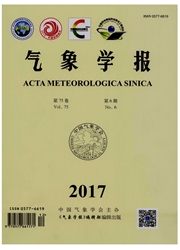

 中文摘要:
中文摘要:
利用热带测雨卫星搭载的测雨雷达10年探测结果,就季尺度亚洲对流降水和层云降水的降水频次和强度及降水垂直结构的特点进行了研究。结果表明春、秋、冬三季东亚季平均降水环西太平洋副热带高压呈带状分布,雨强一般不超过10mm/d;夏季,沿孟加拉湾、中国西南、中国东部至日本的大片雨区中出现了大于12mm/d强降水;亚洲陆面对流和层云降水强度均弱于洋面。亚洲山地强迫不但可引起迎风坡上千公里长度的高降水频次和强降水带,而且导致其下风方向降水频次减少。季尺度降水频次分析表明,亚洲大部分地区对流降水频次小于3%;而层云降水频次一般大于3%,最高可超过10%;副热带高压南侧及西南侧的热带地区对流和层云降水频次均高于副热带高压北侧及西北侧的中纬度地区;降水频次的区域分布还表明,春季中南半岛至中国华南及南海南部对流活动多于同期的印度次大陆。季平均对流和层云降水廓线的季节变化主要表现为“雨顶”高度的季节变化,即降水云的厚度变化;两类降水平均廓线季节变化的区域性差异表明,热带外地区较热带地区显著、陆面较同纬度洋面显著、孟加拉湾比南海显著,而南海和西太平洋暖池无明显的季节变化。此外,降水结构的剖面分析还表明对流降水存在4层结构、层云降水存在3层结构。
 英文摘要:
英文摘要:
The frequency, intensity and vertical structure of convective and stratiform precipitation at seasonal scale in Asia are inves- tigated based on measurements by TRMM Precipitation radar (PR) in the latest ten years (1998 to 2007). Results indicate a nearly banded distribution of seasonal mean precipitation with rain rate no more than 10 mm/d in East Asia around the subtropical anticy- clone in the western Pacific in spring, autumn and winter. However, heavy rain areas of more than 12 mm/d occur in the wide spread Asian summer monsoon region from the Bay of Bengal, southwestern China, eastern China to Japan during summer. Generally, rain intensity of both convective and stratiform precipitation is weaker over land than over ocean. It is the topographic forcing effect in A sia that produces windward heavy rain bands on about 1000 km scale at high frequencies, while weak precipitation usually appears less frequently in the leeward mountain regions. Results also show a convective precipitation frequency less than 3 % in most parts of Asia. For stratiform precipitation, however, its frequency exceeds 3 % with a maximum of about 10 % in Asia. The frequency distributions for both convective and stratiform precipitation in Asia display higher percentages in the tropical region to the south and southwest of the subtropical anticyclone than in the mid-latitude region to the north and northwest of the subtropical anticyclone. Furthermore, the convective precipitation frequency in spring is higher in the Indochlna Peninsula, southern China and south China sea than that in the Indian subcontinent. The seasonal variability of precipitation profiles for both convective and stratiform precipitation is best demon- strated by the changes of the storm top height, i.e. the depth of precipitating clouds, which are stronger in the extratropical regions than in the tropics, stronger over land than over ocean in the same latitude, stronger in the Bay of Bengal than South China Sea. No such a seasonal variability is found in Sout
 同期刊论文项目
同期刊论文项目
 同项目期刊论文
同项目期刊论文
 A new satellite-based census of precipitating and nonprecipitating clouds over the tropics and subtr
A new satellite-based census of precipitating and nonprecipitating clouds over the tropics and subtr Is the tropopause higher over the Tibetan Plateau? Observational evidence from Constellation Observi
Is the tropopause higher over the Tibetan Plateau? Observational evidence from Constellation Observi A new water vapor algorithm for TRMM Microwave Imager (TMI) measurements based on a log linear relat
A new water vapor algorithm for TRMM Microwave Imager (TMI) measurements based on a log linear relat 期刊信息
期刊信息
